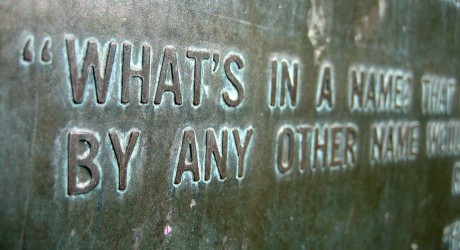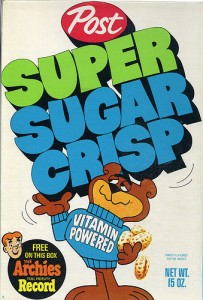Every so often, a really bad name for something is contrived and somehow becomes acceptable. That is, until years later, when its legitimacy is eventually questioned and, ultimately, changed. In the breakfast cereal world, for example, Golden Crisp suffered from the ultra-sweet name of Super Sugar Crisp for nearly 20 years before parents began to question whether giving “super sugar” to their children was the best idea. The cities of Baltimore and Washington, D.C. provide another good example. From 1963 to 1997, the region’s professional basketball team was named the Bullets until the team’s ownership advocated for a less violent name.
I’d like to add another example from the higher education realm to this list: the phrase “nontraditional student”—a long-used naming convention to describe a category of students attending postsecondary education who are not like the “normal” college students. But unlike Super Sugar Crisp and the Washington Bullets, the name may be more than a just poor choice: it’s more of a complete misnomer.
“Nontraditional student” is commonly used to describe an enormous category of undergraduate college students who are unlike the “traditional” students who enroll in college full-time immediately after completing a high school education, are dependent on parents for financial support and don’t work full time. The term is widely used in the press—the Washington Post even used “nontrads” in a recent article—as well as by universities and even by the federal government’s National Center for Education Statistics in its reporting and research initiatives. In short, the name is a widely acceptable and an officially codified way to describe a group of students. It’s also a name that needs to be changed.
There are two main reasons why it needs to be exiled to the Island of Bad Names. First, the name is not even remotely accurate. Super Sugar Crisp may have been really sugary and Mister Salty Pretzel Twists (another terribly named product) may have been really salty. And MOOCs (another horrible name that’s sprung from the higher education world) may be online, massive and open. But “nontraditional students” are not actually nontraditional. On the contrary, they are the established norm in higher education. The Department of Education has reported that 73 percent of undergraduate college students fall into the nontraditional category, and the Council of Graduate Schools has documented the continued rise in the numbers of nontraditional graduate students. Second, and perhaps more important, is that the phrase nontraditional is a terrible way to describe someone. Who, really, wants to be labeled as nontraditional? Is this a label that anyone would embrace?
How have we gone for so long thinking that it is a good idea to label a category of our students as non-traditionalists? There are few others in society that seem to widely embrace this adjective. Google “nontraditional” and you’ll find that eight of the first 10 search results all reference “nontraditional students.” You know what this tells me? No other industry sector besides ours thinks it’s a good idea to label something (worse yet, someone) as nontraditional. In using this term, we are unintentionally marginalizing the population of individuals we seek to recognize.
It’s time that higher education stop using the term altogether. If students are at the center of what we do and we want to make our students—regardless of their age, enrollment status or financial standing—feel like a welcomed part of our institutions, then let’s agree to use more flattering ways to describe them. Let’s put our minds together and think about how students we seek to enroll, retain and graduate would like to be identified. If we want to encourage students of all types to enroll in our programs, let’s show them that we value them by giving them a proper name. I’ve got a few ideas that have nothing to do with breakfast cereal or professional sports teams, and I’ll share those in a future post.
If you have a suggestion, please share it here. In the meantime, I’ll continue to find ways to provide educational access for nontraditional students at Northeastern University’s College of Professional Studies while watching old highlights of the Washington Bullets and eating a bowl of Super Sugar Crisp cereal.






I think there’s now a general stigma for the label “traditional” as well, that those students are going to be less serious about education, spoiled, and immature. There’s a camaraderie formed in the commiseration of student loans that it’s assumed they won’t understand when in fact there could be just as wide a variety of individual situations as the “non-traditional”.
I’m sharing the suggestion of “returning student” (or if Marketing wants something cheesy and zippy, Boomerangs!). Keeping the terminology concentrated on the timeline of the individual rather than any kind of socioeconomic standing. It gives a respectful nod to any age or situation where there would be a gap in time that caused you to voluntarily return to education. As opposed to the “linear student” or “sequential student” which graduates seamlessly from one to the other. I know students who are exceedingly proud of even taking a single year off between High School and Undergrad or Undergrad and Grad. It’s a badge of honor that communicates you experienced the “real world” in one way or another and there’s a story to tell in that. I agree that can be something to be proud of.
Either way there should be reason to make the differentiation between the two. Something that won’t then make either group of students feel, “Hey, that should apply to me too! That’s a word I want associated with myself and education no matter when or where or how I’ve gone about it!”
Very interesting ideas.
I actually embrace my “nontraditionalism” which has contributed to my strong support of the more open admissions policies at CPS but I’ve always been an advocate of the “call me anything but late for dinner” view of the world. Maybe I should advocate to “eccentric” or “eclectic” as more apt descriptions of my personal journey (if not of myself). In any case, your point is well taken - attaching a name or label to anything attaches meaning or connotations that might be completely false (and, in some cases, support the oppression of one group over another).
Maybe we should use “traveler” to describe our fellows along the journey toward knowledge to abandon the (false?) dichotomy between teacher and pupil, learned and unlearned, us and them. I probably learn as much from my “students” as they learn from me - so who is the teacher and who is the student?